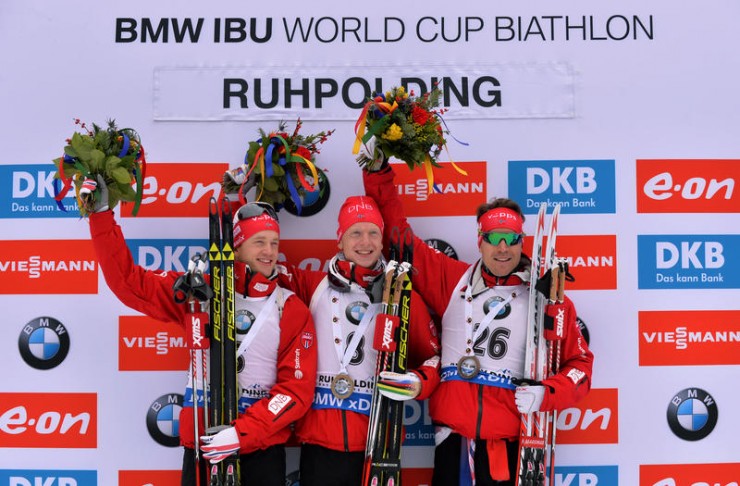
The Norwegian biathlon team must have used the holiday break well, as evidenced by their men’s podium sweep in Friday’s 10-kilometer sprint in Ruhpolding, Germany, the first IBU World Cup of the new year.
Twenty-two-year-old Johannes Thingnes Bø started early in bib 8 and won the race in 21:57.5 minutes, supplanting his brother Tarjei, six years his elder, by 3 seconds after Tarjei started three positions earlier and held the lead until then.
No other athlete could beat the Bø brothers. Emil Hegle Svendsen in bib 26 completed the podium sweep for Norway, finishing 7.6 seconds back in third. The last time Norway took all of the top-three spots was eight years ago during the 2007/2008 season at a sprint in Hochfilzen, Austria.
Johannes Bø also won last season’s sprint in Ruhpolding, thus repeating the feat after a slow start to the season — by his standards.
On a sunny day with essentially no wind on the shooting range, and skiing on an artificial snow loop that had become firmer overnight due to light rain, the Bø brothers and Svendsen all shot clean through both stages.
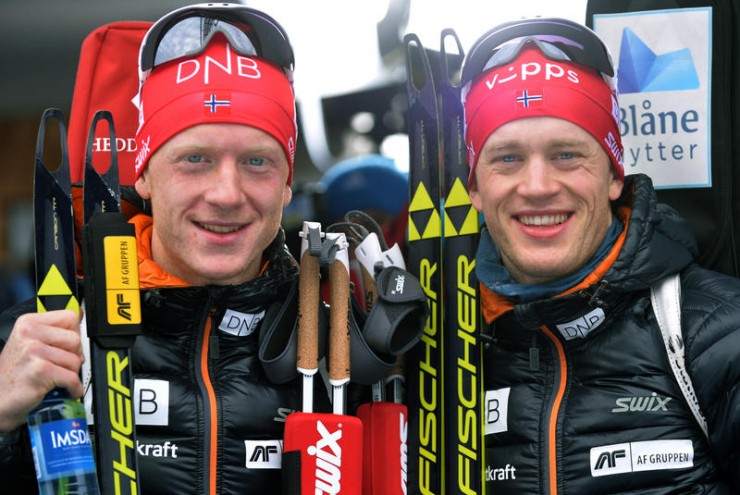
“[Over Christmas] we were just home training … relaxing mostly,” Johannes said during an English interview with his brother with German TV broadcaster ARD. “Watching Christmas movies, eating good food, we relaxed and trained.”
“It’s not so often we take the triple,” added Tarjei. “But today it was a really good, also really relaxed team. Really good skis. Our focus is World Champs in Oslo [in March]. Before Christmas we tried to be too fast. Now we have to wait with our energy to still be good in February.”
Asked about the harmony in the family as competitors, the brothers shared a laugh.
“For me it’s OK, but uh…,” joked winner Johannes, pointing to his brother.
“It’s always some seconds, like in Kontiolahti at the World Champs [last season],” Tarjei replied. “Today it was so close, we shot clean, skied fast … I don’t know what to do. Three seconds. I hope tomorrow [in the pursuit], maybe I can beat him.”
“I have eight or nine World Cup victories. He has one less than me,” Johannes concluded.
“It’s not so often in biathlon when you get three athletes from the same country on the podium,” Svendsen noted in an IBU press release. “It is nice to be here today with the two brothers. This is the best PR we can get for the World Championships. I think it’s going the right way. I am feeling better and better.”
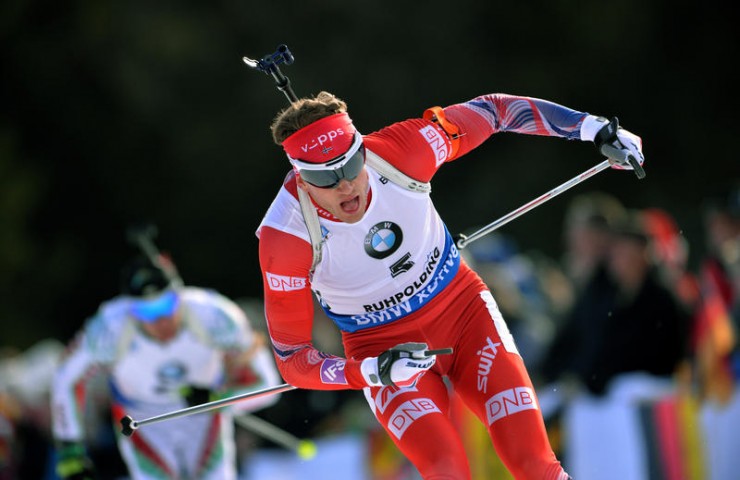
Germany’s Simon Schempp, who has made Ruhpolding his home and is currently third in the overall World Cup standings, did not start due to a cold.
“Of course it’s sad,” commented his coach Mark Kirchner told ARD. “He doesn’t feel too bad, it’s rather a localized infection. But of course his own ambition by now is that when he is starting, he wants to attack the podium, and even just 98 percent of your ability is not enough for that, so that’s why he is not starting today.
“We will observe the situation,” Kirchner continued. “The earliest possible return date is for [the mass start] Sunday, but we won’t force it. The season is long, there are many other goals.”
Similarly, Norway’s superstar Ole Einar Bjørndalen also sat out Friday’s sprint due to an unspecified illness.
As a result France’s World Cup leader Martin Fourcade, despite not feeling well, either, came closest to preventing the Norwegian trifecta. He posted the best course time in the field, but couldn’t overcome a miss on the third target in his prone shooting stage and the resulting penalty lap.
Fourcade crossed the line in fourth place, 10.9 seconds back and just 3.3 seconds off the podium. However, he still collected 43 additional valuable points in the overall ranking (and likely more on Saturday when his toughest competitors, Schempp and Bjørndalen, will not be able to start the pursuit) to widen the gap.
“It was a strange race for me. I was sick last night, I had stomach problems,” Fourcade said in an English interview with ARD. “I was a bit worried this morning, then when I looked on the start list I saw the second [in the World Cup ranking, Bjørndalen] and the third [Schempp] would not race, so to catch some points I decided to start. But my feeling was not so good, and I did a stupid mistake in the prone, that’s why Norway has all three on the podium.
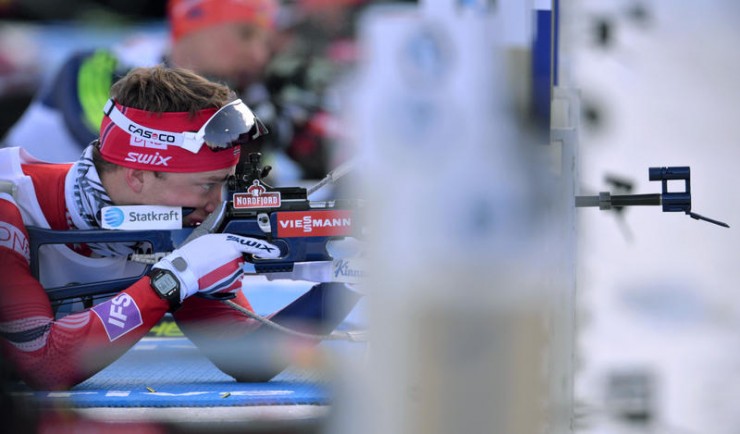
“But they were good,” he continued. “Johannes I think wanted revenge after a strange December month. The same for Emil. That’s good for Norway, they had a huge team result, but that is not a surprise for me.”
Questioned again if he started mainly to increase his World Cup lead, he added: “Yeah, I don’t like to start in that condition, but I woke up and … with my experience even if you are not good to win it, you still have to compete. Now it’s two more competitions without points for Simon and Ole Einar, and I think that’s too much for them [to come back from] even if I am not in super-shape tomorrow because I was sick today.
“That’s the strange thing about the Overall World Cup,” Fourcade said. “Even if you are not good, you have to compete. That’s something I do even if I don’t like that, and I know it’s not good for my body.”
Behind the Norwegians and Fourcade, the Austrian men’s team had their best performance of the season, claiming the next three spots mainly helped by also achieving clean shootings. Sven Grossegger recorded the best individual World Cup result of his career in fifth, 24.4 seconds back, after placing 10th in a sprint during the 2011/2012 season. Teammates Simon Eder was in sixth (+27.5), and Dominik Landertinger took seventh (+39.8).
“I felt good skiing right from the start,” Grossegger said after the race, according to an Austrian Ski Federation press release. “Today were fast, icy conditions. That just suits me. During the shootings I was working well and was focused. In standing position I had a little luck with one shot.”
Smith 15th; Six North Americans Qualify for Pursuit
Early in the holiday break, the International Biathlon Union had announced that the fourth World Cup would be relocated to Ruhpolding, after warm weather conditions made it impossible to produce artificial snow at the originally scheduled location in Oberhof, Germany. Thus Ruhpolding is in the rare situation to be hosting back-to-back World Cups in the same location (ironically, it finally snowed in Oberhof last week, which might have allowed organizers to groom a track, but the decision had already been made).
Biathlon Canada again brought a full men’s roster to the sprint, filling all the five spots allowed for them this season (on the men’s side, only Czech Republic, Germany, France, Norway, and Russia currently have six).
Nathan Smith, the top North American male in the World Cup standings in 13th overall, also had the best result on Friday, finishing in 15th place (+59.9). Unlike most of his teammates, he had not traveled home for the holidays, instead training in France.
On Friday, he started early in the field in bib 7 and clocked the best initial split times. After a fast-and-clean prone stage, he took the lead, ahead of eventual second-place finisher Tarjei Bø, and only Johannes displaced him at the split, leaving the range later.
In standing, Smith missed two targets and the two resulting penalty laps set him back.
“I started off really strong with a clean prone, which put me in second spot going into my standing,” he explained.
“I knew I was in medal contention and I let those thoughts become a distraction,” Smith said, according to a Biathlon Canada press release.
Overall he skied the seventh-fastest course time of all athletes.
“My skiing was good enough for a medal today, but 10/10 (shooting) is a requirement when conditions are perfect,” he added.
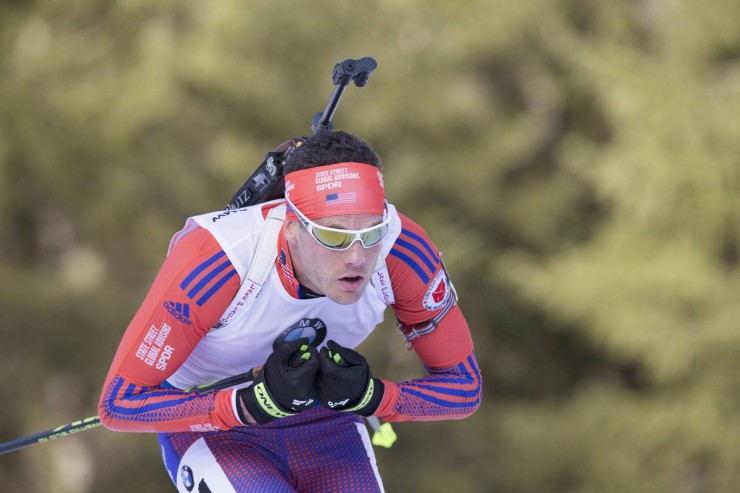
In contrast to the Canadians, the U.S. men only had two athletes start Friday with Tim Burke and Lowell Bailey. Sean Doherty opted for a longer training period block over the holidays in preparation for Junior World Championships in February in Cheile Gradistei, Romania, according U.S. Biathlon Chief of Sport Bernd Eisenbichler. Doherty plans to join his teammates in Ruhpolding on Sunday.
Leif Nordgren was assigned to the IBU Cup team, joining Wynn Roberts, Casey Smith, and Max Durtschi. They will compete this weekend in Nove Mesto, Czech Republic.
According to a press release, US Biathlon plans to call up “an additional athlete per gender” for World Cups 5-6 following this weekend’s IBU World Cup.
Starting shortly behind Smith in bib 11, Burke managed to clean his prone shooting before missing one shot in standing, finishing in 18th, 1:01.3 minutes back.
“The approach to the shooting range is pretty easy here so I knew there would be a lot of good, fast shooting,” Burke explained in an email. “I just tried to stay aggressive in the range and not give up too much time on the shooting mat.”
Overall he recorded the 31st-fastest shooting time. Out on the course he was able to improve his position on each of the three rounds compared to the field, closing out strong with the 13th-fastest final loop and recording the 17th-best overall course time.
“I had not been home for the holidays in a few years so it was a nice change of pace for me,” Burke added. “I definitely still felt a little jet lagged in the race today, but I feel like my body responded well. I expect to feel better with each race, especially since I did not do too much intensity training over the break.
“I would normally hope for a better place in the sprint with one penalty, but considering my recent travel and that this not my favorite course, I am pleased,” he continued.
Closer to the middle of the field of 102 starters in bib 40, Lowell Bailey also recorded a single miss in the standing stage (0+1), but his overall course time ranked 45th time, putting him in 33rd at the finish, 1:01.3 minutes back and one spot behind the winner of the last race of 2015, France’s Jean-Guillaume Béatrix.
One place behind Bailey in 34th was 22-year-old Canadian Christian Gow (+1:03). He managed to clean both stages for a World Cup career best, giving him seven more points in his overall World Cup standing. He improved on his 37th place in the sprint in Pokljuka, Slovenia, just before the holiday break, as well as 39th in a pursuit in Hochfilzen, Austria, earlier this season.
“I am really happy with the race today,” Gow wrote in an email. “It feels great to put out another personal best and also to be in a good position for the pursuit! I am quite surprised by the result today, as I have not had a very productive break since the last World Cup. I, unfortunately, got sick right after Christmas and also took a fall injuring my ribs. Between those two things, I haven’t been able to do intensity until yesterday’s race prep, and that did not go too well for me. Today was a really nice surprise to see that my ski shape didn’t fall off too much despite all of that!”
His older brother Scott Gow finished the sprint in 47th (+1:48.1) with two penalties (1+1), and teammate Macx Davies placed 55th (+1:53.5) with a single prone miss and one in standing as well.
The fifth Canadian, Scott Perras competed in his first World Cup race of the season and placed 72nd (+2:27.5), after two prone penalties (2+0).
Perras replaced Brendan Green for the race, who “has been nursing a small injury,” according to Biathlon Canada’s High Performance Director Eric de Nys. Green is expected to be back for next weekend’s World Cup races in Ruhpolding.
Only Perras missed the top-60 cut for Saturday’s pursuit.
“It was a decent day considering the athletes hopped off the plane on Monday and training has been limited with the lack of snow,” de Nys wrote in an email. “We will look to improve on these results in the coming days.”
Harald Zimmer
Harald has been following cross-country skiing and biathlon for some 20 years since the Olympic Winter Games in Albertville and Lillehammer. A graduate of Middlesex University London and Harvard University, he now lives near the Alps where he likes to go skiing, snowboarding and hiking. He is a former track athlete in middle-distance running, as well as a huge NBA fan.



